Diomedes
Created | Updated Mar 13, 2004
Radio show 2-3-'04 Richard Creasey BBC Radio 4?_
Audio Radio show 2-3-'04 Richard Creasey
32kbs Voice
Helix Server Version 9.0.2.881 (sunos-5.8-sparc-server)
|
| ||||
|
|
|
I am on the isolated coast line of an alaskan island called Saint Lawrence
And I am leaning back on a thirty five knot wind.
Wich is howling down from the arctic,
and just fourty miles away to the west is the russian coastline
|
And I can just see the white snow capped mountains of siberia
and between me and them,
is what the escimo villagers here used to call the 'Ice Curtain'
It is where the date line and more importantly
the international border between russia and america is.
But this was not always the case,
only a hundred and fifty years ago,
the whole of alaska was russian
|
|
| ||||
|
| ||||
|
Tatiana Stepanaber who emigrated here to Juneau,
Alaskas capital city, from russia.
After winning a green card lottery.
Yes, just over two years ago, Tatiana won the jackpot.
The right for here and the family to move from russia
to live and work in the u s a.
It is not at all surprising that she was immediately attracted
to all things russian,
especially the russian heritage of this part of the world.
for it was [an appare ?] up here the russian navy
that Titrus Berring a danish sea captain, first
came along the alaskan coast in seventeen forty one.
Soon fur hunters and traders began to drift accross the strait
into what they discribed as 'Boshoi Zimnia', or the great land.
Richard Danhauer is an author and historian in Juneau.
| ||||
|
|
Tatiana works in the alaskian state archives
and she was overwhelmed by the apparent good
relations between many of the russians
and the indiginous people who lived in alaska.
Indeed centuries later many of them still share the same religion
| ||||
|
|
The native americans in alaska
use the name linked to their tribal language
Nora Danhauer is a clinkert
| ||||
| ||
| ||
|
| ||||
|
The success of the russian american company was alot the
caracter of Alexander Berrinhof he was a resourceful and
charismatic man who collaborated with the indigious people
and even learned to speek many of their languages.
The russian american company was not unlike
the brittish east india company
and had the potential to expand further into alaska.
The conditions where never easy
| ||||
|
And in a way you could argue that they got quite a good deal
because in one ways it was not theirs to sell.
| ||||
|
And so in alaska today there where still traces
of russias toho in the new world
In a land where the traditions of the clinkert people
are still passed on from generation to generation.
|
| ||||||
|
| ||||
|
Peter Schweitzer professor of anthropology on the university of Alaska in Fairbanks
| ||||
|
So here for the first time is the boundary
seperating the people of two great land masses
We are so used to the idea that russia and america
are ideologically and even seemingly physically far apart
that it is hard to realise
that here at the bering strait they almost touch
Peter Schweitzer has made a study of the indigeanous groups
in this part of the world
| ||||
|
| ||||
|
Anders is an speek siberian yupic
and he lives on Saint Lawrence Island
heritage of the u s a and is therefore an american citizen
and is given an english name.
| ||||
|
So where did your name 'Anders' come from?
|
| ||||
|
And what is your real name?
| ||||
|
And what is the name of the Island in yupic?
| ||||
|
|
|
To get here, to the village of Gambell
on the island of Saint Lawrence
I have flown a small dozen seater plane.
We are just a few miles south of the arctic circle
And from here for centuries, millenea in fact
Siberian ypics would cross the bering strait
in seal skin boats, to visit their relations
on the mainland of russia.
Indeed this tiny island wich 'Anders' accurately discribed
as looking like squeesed gravel
from the bottom of the bering strait
is closer to russia then the mainland of america
|
Do you find it strange that as your relations,
your cousins are only thirty miles away,
and you can see the russian chukotka coast
Do you find it strange that they have to go trough customs,
do you think that is wrong?
| ||||
| ||||
|
Back on the mainland of america
in the former goldrush city of Nome in Alaska
I met Charlie Johnson the chief U.S./Alaska commissioner
of the bering straits regional commission
He explains some of the history of cross border relationships
up until the early twentieth century
| ||||
|
And when you say trade, what where people doing,
what was it like the other people in this part of the world
| ||||
|
|
But it was the arrival of the soviet union
which had change all this
For the first time,
what was become to be locally known as the
'Ice Curtain' was introduced
And this was soon to split indiginous families apart
|
| ||||
|
| ||||
|
Victor Goldsberry owner of the tacolga alaskip shop in Nome,
has pianting and books and crosses
all over the Chackocory region of syberia
married to some one who has crossed the boundary
he has a vast knowledge of the bering strait region
and the time when relationships first froze up
The very backdoor for america and russia
are the Diamedes only two miles seperate them and
|
the international date line and the border
wich in ninetheen forty eight snapped shut
|
|
|
| ||||
| ||||
|
Naturally it was not long before the american military
found itself constracting
on their backdoor with the soviet union
Curtle Might Bridges is commander
in the first batalion alaskan national guard
| ||||
|
|
|
| ||||
| ||||
|
Journalist and energy expert Larry Persily
has also made a study of the region
| ||||
|
And you see that growing in the future?
| ||||
|
The collapse of the soviet union has
also brought an existent peace talk evidence
to the historians of alaska
For Richard Daunho in Juneau
a new and rich piece of research was opening up
| ||||
|
|
Next week I will be back
|
on the wind swept alaskan island of Saint Lawrence
with people who recently crossed
the icy waters of the bering strait
in open dingies
And I will be talking to eighty year old Winifred James
about the traditional wallrus skin boats
that are still used to hunt whale
| ||||
|
|
|
|
We are off now,
we are off towards the north coast,
wich is only a coouple of miles from the arctic circle
and not very far from the north pole
and the wind is commig directly down from those
I is the prevailing wind
now we are just comming
to the crastinous pebble dune
and I can see russia
and there it is glisting in the sunlight
between the cloud and you can see the,
the white cliffs of siberia
very very close and it is quite clear
that people regulary where able to
from there to here
when the weather conditions where right
in the summer time
|
|
|
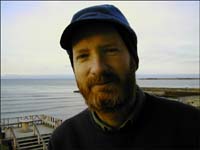 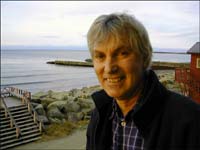 | ||||
|
 Richard Dauenhaner:
Richard Dauenhaner: 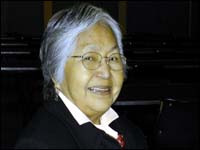 Nora Dauenhaner:
Nora Dauenhaner: 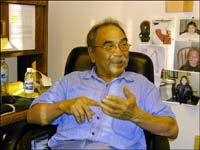 Charlie Johnson:
Charlie Johnson: 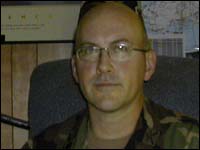 Colonel Mike Bridges:
Colonel Mike Bridges:  Larry Persily:
Larry Persily: 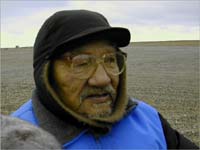 Winifred James:
Winifred James: 